|
|
|
Sort Order |
|
|
|
Items / Page
|
|
|
|
|
|
|
| Srl | Item |
| 1 |
ID:
148303


|
|
|
|
|
| Summary/Abstract |
The public expects European governments and the European Union (EU) to deal with the security challenges in and around Europe. So does the US, whose strategic focus has pivoted to the Pacific. Washington, DC has made it clear that it will not, and cannot, solve all of Europe’s problems. The call for ‘strategic autonomy’ in the new EU Global Strategy of June 2016 does not come a moment too soon. But should the aim be EU strategic autonomy, without the UK, or can the aspiration still be European strategic autonomy, with the UK? Can nothing be achieved unless all are fully involved? Or are intermediate solutions possible? How EU Member States and the UK answer these questions will determine which degree of strategic autonomy the EU can achieve. With which degree of British involvement. And whether the UK itself will be left with any measure of strategic autonomy.
|
|
|
|
|
|
|
|
|
|
|
|
|
|
|
|
| 2 |
ID:
148297
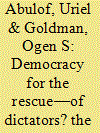

|
|
|
|
|
| Summary/Abstract |
Intrastate conflicts, long eclipsing interstate conflicts, are often internationalized. This paper examines internationalized intrastate conflicts through the types of both the intervening and the embattled regimes. Do democracies, more or less than autocracies, support autocratic governments in their fights against rebels? This paper tests three hypotheses: (1) democracies support autocrats fighting rebels less than autocracies do. (2) Democracies support democratic governments fighting against rebels more than autocracies do. (3) The more democratic two states are, the higher the probability one would support the other’s fight against rebels. Covering all documented external support in intrastate wars (1975–2000), our findings support hypothesis one and two only partly and confirm hypothesis three. However, comparing the two major accounts of the Democratic Peace theory (DPT)—the normative and the structural—our findings corroborate only the former robustly. The paper thus helps enriching the insights of the DPT beyond interstate conflicts.
|
|
|
|
|
|
|
|
|
|
|
|
|
|
|
|
| 3 |
ID:
148301
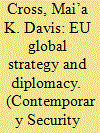

|
|
|
|
|
| Summary/Abstract |
The new EU Global Strategy has significant implications for EU diplomacy, in terms of both goals and means. This article first analyses the timing of the strategy as an exercise in diplomacy in its own right. Second, it argues that the strategy outlines a more expansive and noticeably more smart power-oriented approach to diplomacy in practical terms. Finally, it notes that the strategy has a new meta-narrative for EU diplomacy, which seeks to project a blend of both realistic assessment and idealistic aspiration.
|
|
|
|
|
|
|
|
|
|
|
|
|
|
|
|
| 4 |
ID:
148300
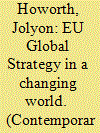

|
|
|
|
|
| Summary/Abstract |
The world is entering a period of power transition, at the outcome of which some new form of global order (or disorder) is likely to emerge. Critical to this process is the interaction between the established powers, the USA and the European Union (EU), and the emerging powers, particularly China, Brazil, India and Russia. Many analysts have classified the EU as a declining power, a perception that has been enhanced with the triple crises of sovereignty that have rocked the Union since the mid-2000s (money, borders and defence). In this context, the publication of the EU Global Strategy was an opportunity for the EU to state clearly the nature of its ongoing and future relations with the rest of the world. This article argues that, in reality, Europe as a bloc (as opposed to its member states severally) has very limited purchase with the other major powers, and an ambivalent or ill-defined grasp of how to engage with them. They, for their part, have difficulty in knowing how to understand the EU as an actor and prefer to deal bilaterally with its key member states.
|
|
|
|
|
|
|
|
|
|
|
|
|
|
|
|
| 5 |
ID:
148296


|
|
|
|
|
| Summary/Abstract |
Despite the burgeoning literature on Russia’s renewed power politics, little attention has been paid to the fact that US reactions towards Russia’s military interventions were all but coherent. The USA has chosen weak measures in Georgia in 2008 (shaming) compared to its assertive response in Ukraine in 2014 (sanctions, hard deterrence). This article assesses the explanatory power of neorealist, liberal and constructivist theories for the variation in US reactions towards Russian interventions in Georgia and Ukraine. Our argument is that the constructivist perspective explains the cases best as it highlights the power and communality of normative assessments. The Ukraine crisis was perceived by the USA as a violation of core international norms, especially the non-use of force and the principle of territorial integrity. Relevant international norm carriers shared this assessment of the conflict. In contrast, the perception of the Georgian war centred on the issue of democracy promotion. While democracy is an important aim of US foreign policy, it does not summon the same normative importance as general principles of international law. Furthermore, the perception of the Georgian war remained contested among Western allies, which decreased the communality of the normative assessment.
|
|
|
|
|
|
|
|
|
|
|
|
|
|
|
|
| 6 |
ID:
148299
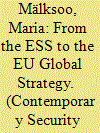

|
|
|
|
|
| Summary/Abstract |
Security strategies are important sites for narrating the EU into existence as a security actor. The unveiling of a new global strategy on foreign and security policy for the EU immediately post-Brexit could be conceived as a pledge to remain together as a Union for the purposes of contributing to global security in a particular way. This paper offers a brief stock-taking of the EU’s way of writing security from the European Security Strategy (2003) to the EU Global Strategy (2016). A concise exegesis of these documents exposes an interesting dynamic: as exercises in ordering the world, both strategic guidelines have turned out to be major exercises in ordering the self. The comparative snapshot shows the EU as increasingly anxious to prove its relevance for its own citizens, yet notably less confident about its actual convincingness as an ontological security framework for the EU’s constituent members over time.
|
|
|
|
|
|
|
|
|
|
|
|
|
|
|
|
| 7 |
ID:
148304
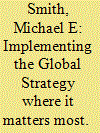

|
|
|
|
|
| Summary/Abstract |
The EU Global Strategy (EUGS) is a broad and ambitious document in terms of its geographic scope and thematic priorities. However, the EU cannot devote equal attention to all aspects of the EUGS; so there is still scope for more clarity regarding the EU’s core strategic aims. This article argues that in addition to fostering internal cohesion, the EU’s strategic priority must involve stabilizing its own neighbourhood. This task has challenged the EU for decades because of an inherent credibility deficit regarding the EU’s own capabilities, yet the EUGS does not diagnose and remedy this problem as effectively as it could have. Therefore much more work will need to be done in terms of reforming EU institutions and developing common capabilities if the EU hopes to achieve its central internal and external security goals as outlined in the EUGS and related policy statements.
|
|
|
|
|
|
|
|
|
|
|
|
|
|
|
|
| 8 |
ID:
148305
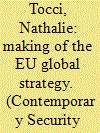

|
|
|
|
|
| Summary/Abstract |
This article traces the evolution of the EU strategic reflection which culminated in the publication of the EU Global Strategy (EUGS) in June 2016. It explains the choices made by EU High Representative Federica Mogherini over this time period—including both the initial strategic assessment and the final EUGS. It provides a behind the scenes view on the players, the organization and the methods of work used to produce a strategic vision for the EU’s role in the world.
|
|
|
|
|
|
|
|
|
|
|
|
|
|
|
|
| 9 |
ID:
148298
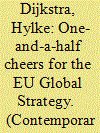

|
|
|
|
|
| Summary/Abstract |
EU High Representative Federica Mogherini presented her EU Global Strategy (EUGS) in June 2016. Encircled by security crises, it is difficult to think of something more important for Europe than collective action with the aim of weathering the storm. The EUGS, in this respect, seeks to define common ends and identify means. So what do we make of the EUGS? What does the EUGS tell us about the current role of the EU in global affairs? And how will the withdrawal of the UK from the EU affect foreign and security policy? As a way of introduction to the forum, this article notes that the EUGS focuses on the neighbourhood, puts the interests of European citizens first, identifies civilian means, and has created momentum on security policy. The key question, however, remains whether there is any interest in the EUGS beyond the foreign policy elites.
|
|
|
|
|
|
|
|
|
|
|
|
|
|
|
|
| 10 |
ID:
148302


|
|
|
|
|
| Summary/Abstract |
A striking difference between the EU’s 2016 Global Strategy and its 2003 predecessor is the ubiquity of resilience as a new leitmotif, understood as the ability of states and societies to reform, thus withstanding and recovering from internal and external crisis. Resilience provides a middle ground between over-ambitious liberal peace-building and under-ambitious stability, (re)directs attention to local resources and practices, and is ambiguous enough to be acceptable to everyone. The Global Strategy’s leitmotif is an example of the rise and spread of resilience in international discourses about crisis management and humanitarian emergencies. Although there are risks inherent to the way in which resilience reframes risks and crises, its added value lies in its power as convening concept, opening up international organizations to new ways of thinking and working, and providing a common ground for engagement.
|
|
|
|
|
|
|
|
|
|
|
|
|
|
|
|
|
|
|
|
|